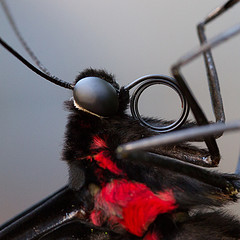 Evolution
Evolution
 Faith & Science
Faith & Science
Can Butterflies Be Intellectual Snobs?
 Jerry Coyne asks an amusing question: “Are atheists intellectual snobs?“
Jerry Coyne asks an amusing question: “Are atheists intellectual snobs?“
Coyne asks the rhetorical question while commenting on a review of Peter Watson’s book The Age of Atheists: How We Have Sought to Live Since the Death of God. I’m reading Watson’s book now, and I recommend it highly. Watson, an atheist, is a fine writer with impressive historical and cultural knowledge. He recounts the cultural and intellectual rise of atheism, focusing on the late 19th and 20th centuries. He discusses Nietzsche, pragmatism, phenomenology (which is as far as I’ve gotten). Watson is metaphysically clueless — he seems to have neither grasp of nor interest in the actual truth of the atheistic claim — but he is fascinated by the social and cultural working-out of the “death” of God. Watson repeatedly discusses in fascinating detail the odious unfolding of various atheist lunacies (the back-to-nature movement and its relation to Nazism in Germany is one of many examples), but in each chapter he concludes with the blithe inference that atheism does wonderful things for man and culture, despite a few little detours.
A great read, if you keep in mind that Watson has nasty inferential and metaphysical lacunae.
Anyway, Coyne asks “Are atheists intellectual snobs?” He answers, of course, no, because atheists have the better argument, and if you have a better argument you just can’t be a snob.
I would agree with Coyne’s conclusion: atheists aren’t snobs, about intellectual matters anyway, and they can’t be snobs about intellectual matters. But my reasons for this conclusion differ from Coyne’s. Snobbery depends critically on actual excellence — a rich person can be a snob about wealth, but a poor person can’t. An art connoisseur can be a snob about his collection of paintings, but a blind man who knows nothing of painting can’t. A good writer can be a snob about good writing, but an illiterate man can’t.
In intellectual matters, atheists of the New Atheist sort are the poor blind illiterates of intellectuality. How can third-rate “intellectuals” like Coyne and Dawkins and Krause and Atkins and Myers and Moran be intellectual snobs? Can they snobbishly lord their deep knowledge of metaphysics or theology or the philosophy of free will over the rest of us?
The question answers itself.
Mary Midgley, a superb philosopher quite capable (but innocent I think) of snobbery, quipped about why she was reluctant to criticize Richard Dawkins’s forays into philosophy: she had “not attended to Dawkins, thinking it unnecessary to ‘break a butterfly upon a wheel.'”
Butterflies cannot be snobs. New Atheists are any number of things, but intellectual snobbery is, as a matter of definition, denied to them.
